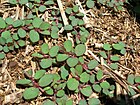Note: This is a project under development. The articles on this wiki are just being initiated and broadly incomplete. You can Help creating new pages.
Difference between revisions of "Euphorbia prostrata - Dugdhikā"
| Line 2: | Line 2: | ||
'''Dugdhika''' is a pantropical weed, possibly native to India. It is a hairy herb that grows in open grasslands roadsides and pathways. It is widely used as a medicinal herb. | '''Dugdhika''' is a pantropical weed, possibly native to India. It is a hairy herb that grows in open grasslands roadsides and pathways. It is widely used as a medicinal herb. | ||
==Uses== | ==Uses== | ||
| − | {{Uses|Cough}}, {{Uses|Coryza}}, {{Uses|Bronchitis}}, {{Uses|Asthma}}, {{Uses|Worm infestations}}, {{Uses|Dysentery}}, {{Uses|Jaundice}}, {{Uses|Pimples}}, {{Uses|Gonorrhoea}}, {{Uses|Digestive problems}}, {{Uses|Tumours}}<ref name=" | + | {{Uses|Cough}}, {{Uses|Coryza}}, {{Uses|Bronchitis}}, {{Uses|Asthma}}, {{Uses|Worm infestations}}, {{Uses|Dysentery}}, {{Uses|Jaundice}}, {{Uses|Pimples}}, {{Uses|Gonorrhoea}}, {{Uses|Digestive problems}}, {{Uses|Tumours}}<ref name="Karnataka Medicinal Plants"/> |
==Parts Used== | ==Parts Used== | ||
| − | {{Parts Used|Leaves}} | + | {{Parts Used|Leaves}}<ref name="Karnataka Medicinal Plants"/> |
==Chemical Composition== | ==Chemical Composition== | ||
| Line 11: | Line 11: | ||
==Common names== | ==Common names== | ||
| − | {{Common names|kn=Akkegida|ml=Nelapalai|sa=Nagarjuni, Pusitoa|ta=Amman Pacharisi|te=Nanabala|hi=Lal Dudhi|en=Equirity}} | + | {{Common names|kn=Akkegida|ml=Nelapalai|sa=Nagarjuni, Pusitoa|ta=Amman Pacharisi|te=Nanabala|hi=Lal Dudhi|en=Equirity}}<ref name="Karnataka Medicinal Plants"/> |
==Properties== | ==Properties== | ||
Revision as of 13:02, 8 March 2023
Dugdhika is a pantropical weed, possibly native to India. It is a hairy herb that grows in open grasslands roadsides and pathways. It is widely used as a medicinal herb.
Contents
- 1 Uses
- 2 Parts Used
- 3 Chemical Composition
- 4 Common names
- 5 Properties
- 6 Habit
- 7 Identification
- 8 List of Ayurvedic medicine in which the herb is used
- 9 Where to get the saplings
- 10 Mode of Propagation
- 11 How to plant/cultivate
- 12 Commonly seen growing in areas
- 13 Photo Gallery
- 14 References
- 15 External Links
Uses
Cough, Coryza, Bronchitis, Asthma, Worm infestations, Dysentery, Jaundice, Pimples, Gonorrhoea, Digestive problems, Tumours[1]
Parts Used
Chemical Composition
Alkanes, Triterpenes, Phytosterols, Tannins, Polyphenols, and Flavanoids[2]
Common names
| Language | Common name |
|---|---|
| Kannada | Akkegida |
| Hindi | Lal Dudhi |
| Malayalam | Nelapalai |
| Tamil | Amman Pacharisi |
| Telugu | Nanabala |
| Marathi | NA |
| Gujarathi | NA |
| Punjabi | NA |
| Kashmiri | NA |
| Sanskrit | Nagarjuni, Pusitoa |
| English | Equirity |
Properties
Reference: Dravya - Substance, Rasa - Taste, Guna - Qualities, Veerya - Potency, Vipaka - Post-digesion effect, Karma - Pharmacological activity, Prabhava - Therepeutics.
Dravya
Rasa
Tikta (Bitter), Kashaya (Astringent)
Guna
Laghu (Light), Ruksha (Dry), Tikshna (Sharp)
Veerya
Ushna (Hot)
Vipaka
Katu (Pungent)
Karma
Kapha, Vata
Prabhava
Habit
Identification
Leaf
| Kind | Shape | Feature |
|---|---|---|
| Paripinnate | Opposite | 4 cm long, 1-1.5 cm wide, oblong-lanceolate, with a pointed tip and a finely toothed margin |
.[3]
Flower
| Type | Size | Color and composition | Stamen | More information |
|---|---|---|---|---|
| Unisexual | 2-4cm long | Greenish or pinkish | Peduncles reddish brown | Flowering throughout the year and In terminal and/or axillary pseudoracemes |
Fruit
| Type | Size | Mass | Appearance | Seeds | More information |
|---|---|---|---|---|---|
| Globular clusters | Inflorescence dense, globular clusters | Hairy, 3-lobed capsule, 1.25-2 x 1.5 mm, splitting into three | 1-seeded | Fruiting throughout the year |
Other features
List of Ayurvedic medicine in which the herb is used
- Vishatinduka Taila as root juice extract
Where to get the saplings
Mode of Propagation
How to plant/cultivate
Prefers a light well-drained moderately rich loam in an open sunny position[4]
Commonly seen growing in areas
Waste places in lowland, Cultivated fields in lowland, Moist open places
Photo Gallery
References
- ↑ 1.0 1.1 1.2 Karnataka Medicinal Plants Volume - 2” by Dr.M. R. Gurudeva, Page No.223, Published by Divyachandra Prakashana, #45, Paapannana Tota, 1st Main road, Basaveshwara Nagara, Bengaluru.
- ↑ Chemistry
- ↑ Plant description
- ↑ Cultivation details
External Links
- Ayurvedic Herbs known to be helpful to treat Cough
- Ayurvedic Herbs known to be helpful to treat Coryza
- Ayurvedic Herbs known to be helpful to treat Bronchitis
- Ayurvedic Herbs known to be helpful to treat Asthma
- Ayurvedic Herbs known to be helpful to treat Worm infestations
- Ayurvedic Herbs known to be helpful to treat Dysentery
- Ayurvedic Herbs known to be helpful to treat Jaundice
- Ayurvedic Herbs known to be helpful to treat Pimples
- Ayurvedic Herbs known to be helpful to treat Gonorrhoea
- Ayurvedic Herbs known to be helpful to treat Digestive problems
- Ayurvedic Herbs known to be helpful to treat Tumours
- Herbs with Leaves used in medicine
- Herbs with common name in Kannada
- Herbs with common name in Hindi
- Herbs with common name in Malayalam
- Herbs with common name in Tamil
- Herbs with common name in Telugu
- Herbs with common name in Sanskrit
- Herbs with common name in English
- Habit - A small wiry straggler
- Index of Plants which can be propagated by Seeds
- Herbs that are commonly seen in the region of Waste places in lowland
- Herbs that are commonly seen in the region of Cultivated fields in lowland
- Herbs that are commonly seen in the region of Moist open places
- Herbs
- Euphorbiaceae




